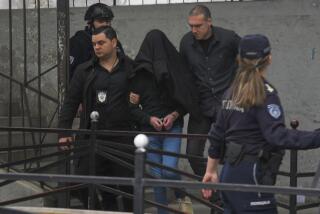Giving Voice to Tragedy : Bosnian Muslim Youth Blinded by a Bomb Dedicates His New Life in America to Explaining the War
MISSION VIEJO — At 15, Sead Bekric was a poster child for Serbian atrocity.
Splashed on the cover of magazines worldwide, Bekric’s ruined face--the result of a Serbian schoolyard bombing in 1993 that killed several of his schoolmates--gave mute testimony to the depravity and agony caused by war in the former Yugoslav republic.
“So many people saw my picture,” said Bekric, who was brought to Anaheim three years ago by a sympathetic benefactor. “Now they can hear my voice.”
In thickly accented English, the teenager talks about the strife in his native Bosnia to anyone who will listen, from a small group of senior citizens in Mission Viejo to a recent gathering of 1,200 at a pharmaceutical company in Irvine.
Bekric was permanently blinded by the attack. But his face was repaired through plastic surgery in Southern California, and he learned English by immersing himself in as many activities as possible after enrolling at Anaheim High School.
Now, the teenager participates in karate, rock climbing and horseback riding. He volunteers for the American Red Cross and wants to become a radio personality.
But much of his passion is directed into spreading the word about the plight of his people, the Bosnian Muslims.
“I want to talk about Bosnia, explain what [the war] is about,” he told a Braille class in Mission Viejo last week. “Some people believe it is fought over religion. But I believe the basic problem is the land.”
Bekric painted a word picture of the verdant farming community where he lived. It is the fertile farmland that Serbs want to absorb, he said, and ethnic cleansing is little more than an excuse to take over Bosnian territory.
The worst part of the war, he said, is that it holds no sympathy for the children.
“I have seen many bad things,” Bekric said. “What I have heard about what has gone on over there since I have been in the United States, I believe it.” Several members of his family, including his father, are missing, and he thinks “it’s probably 95% sure that he’s dead.”
Still “I don’t hate them,” he said of the Serbs. “Some Serbian people are good people. It’s the leaders” who are committing the atrocities.
Bekric’s mother and sister came over with him in 1993 and live about a block away while he stays with his sponsor, Claire Maglica, who helped bring the family over from Bosnia.
“When I saw Sead on television, I thought, ‘This has to stop,’ ” she told the Braille group. “I think Sead affected the whole world. One French magazine called him ‘the child that made the whole world cry.’
“What I’ve given Sead, I can’t say,” Maglica said. “What he has given me is courage.”
Some 25 senior citizens from the Braille class listened closely to Bekric, peppering him with questions.
One elderly woman raised her hand and asked Bekric how he has adapted to being blind while adjusting to a new life in a strange country.
“Well, it seems hard and frightening,” he told them. “But when you get used to it, it’s not such a big deal.
“I do much better here, because [being blind] in Bosnia, there’s not much to do,” Bekric said. “There are so many things to do here.”
Afterward, they gathered around the teenager, hugging and offering words of praise for his speech.
“I haven’t understood to this minute what was going on over there,” Bill Barmore said. “And now, listening to this young man for three minutes, it’s clear.”
More to Read
Sign up for Essential California
The most important California stories and recommendations in your inbox every morning.
You may occasionally receive promotional content from the Los Angeles Times.









